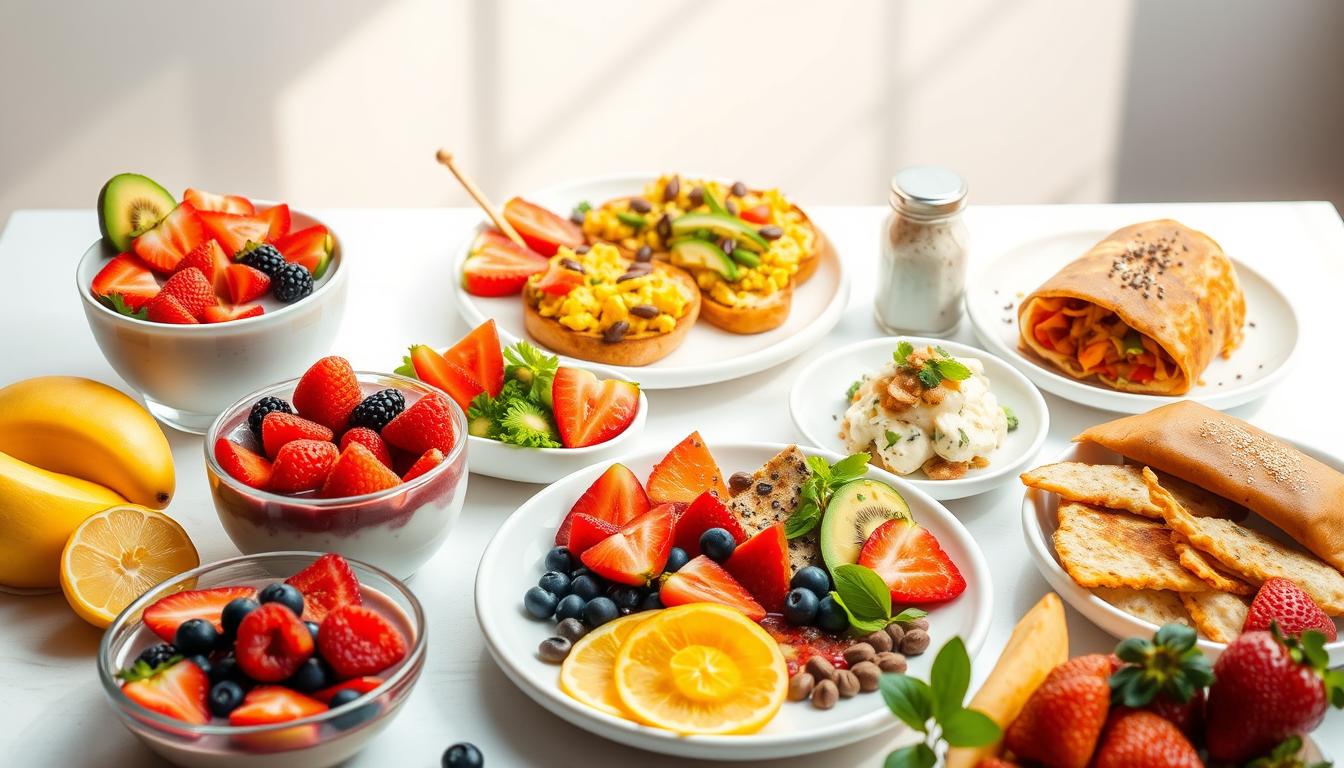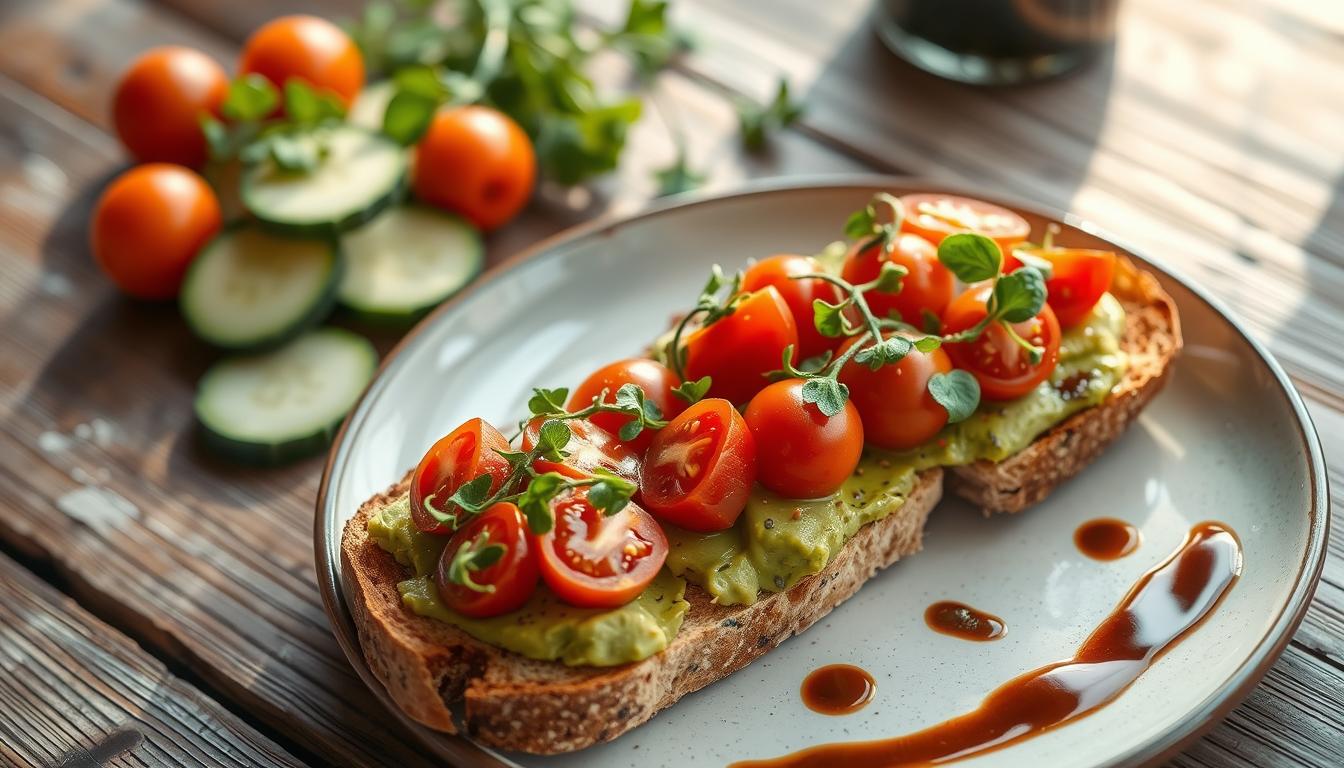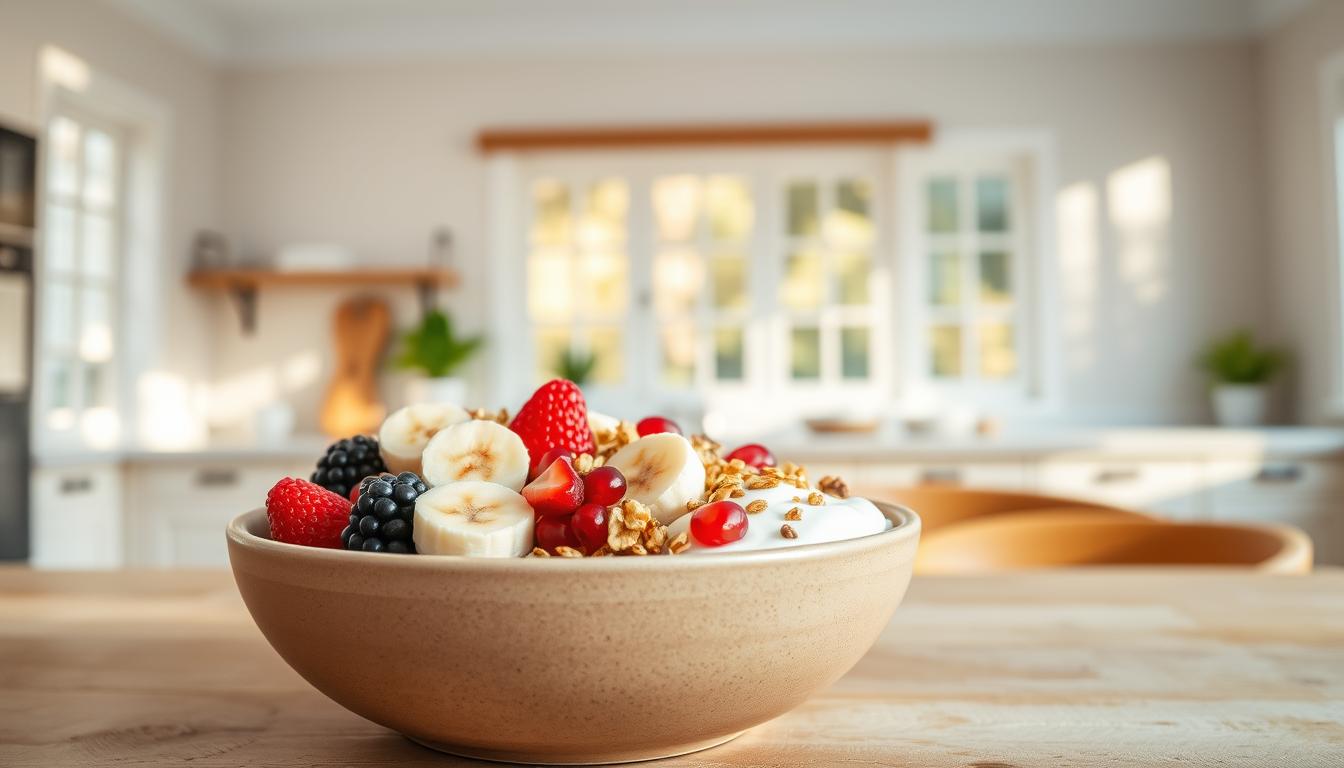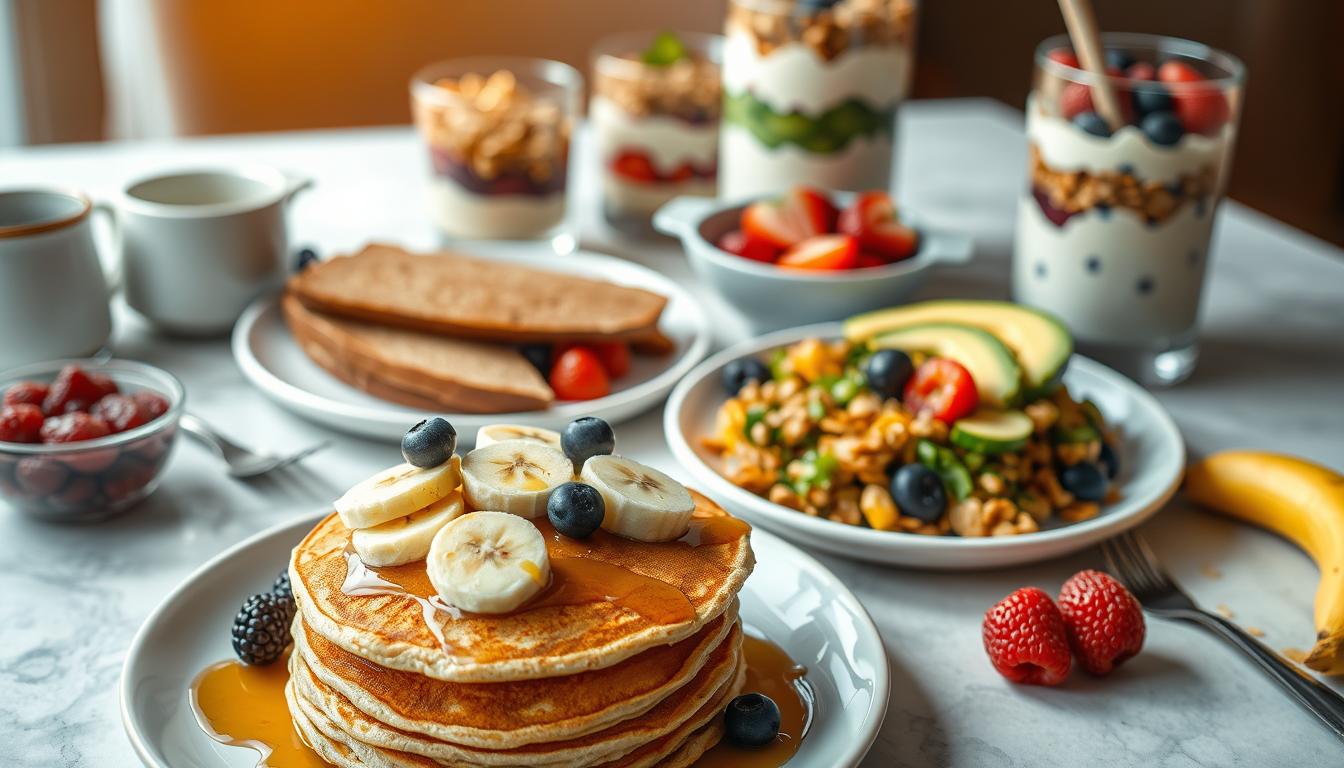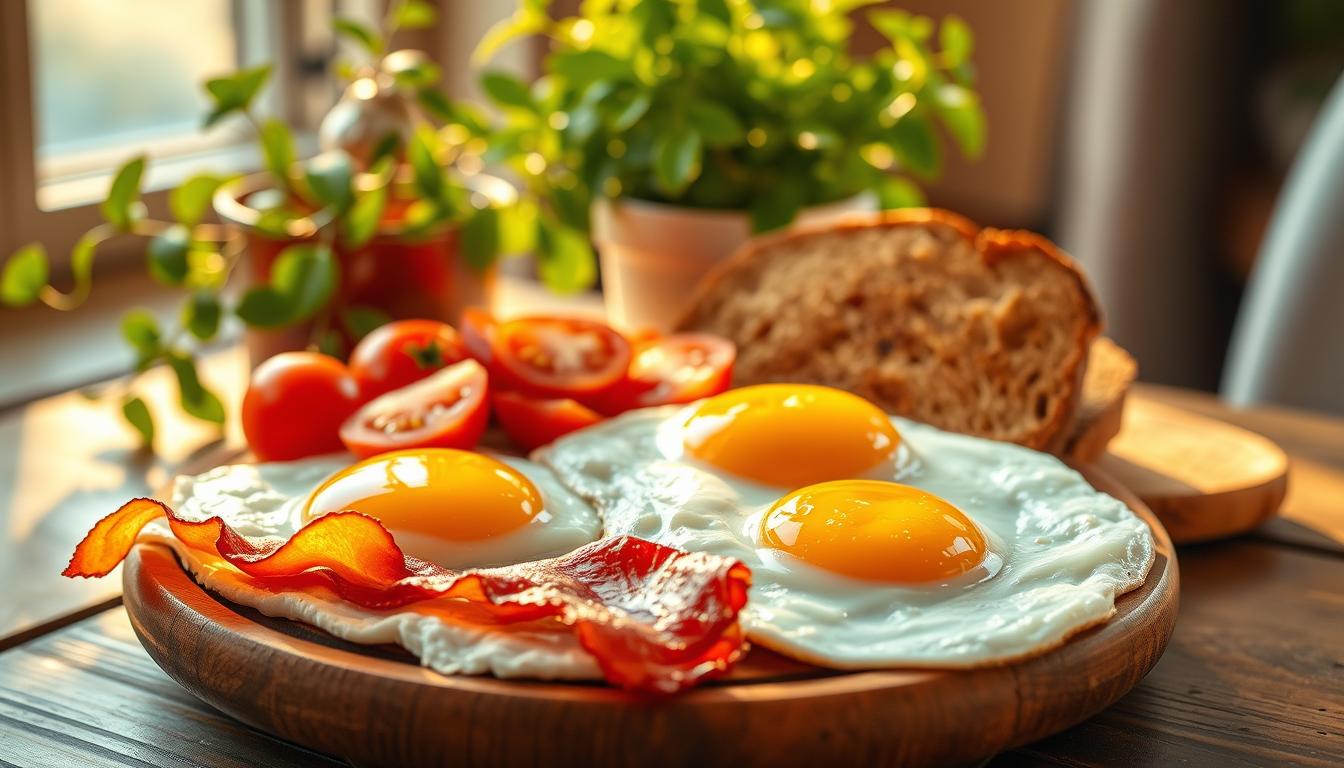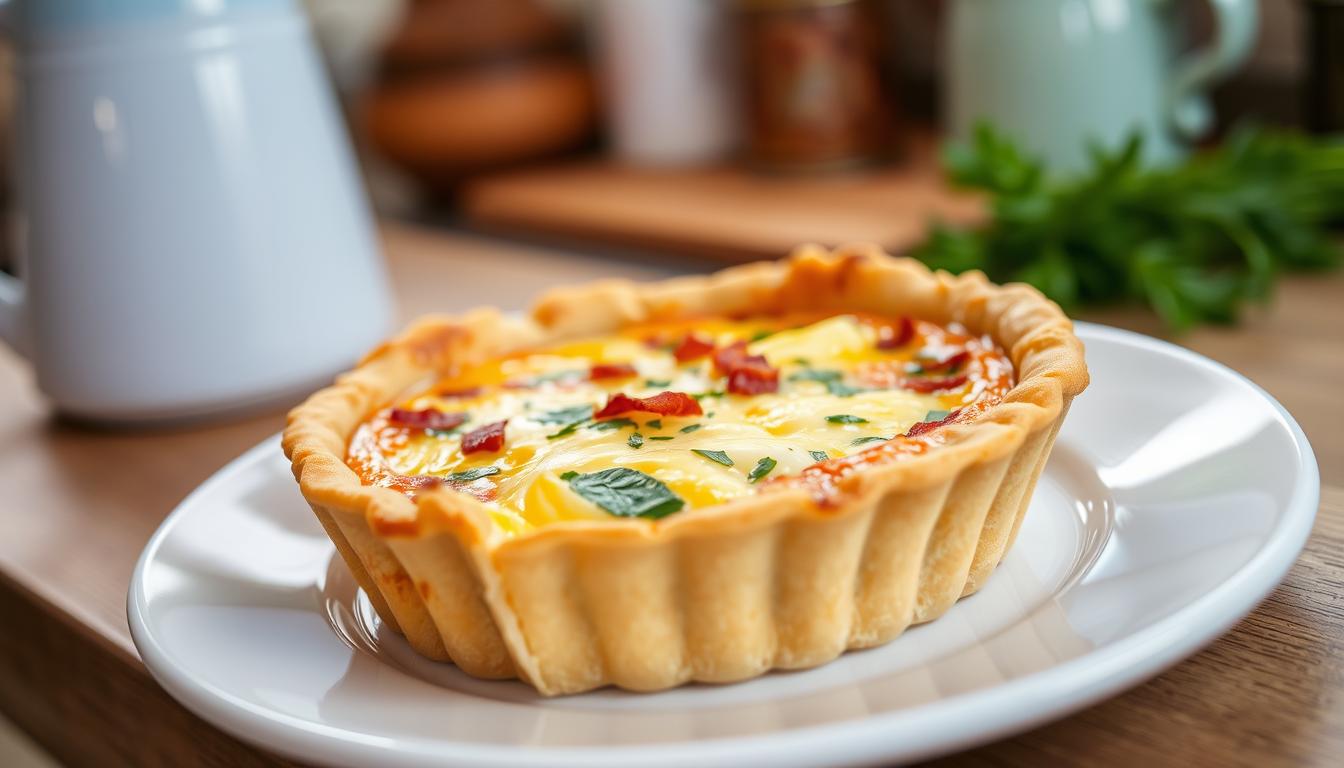Authentic Irish Potato Pancakes: Crispy and Flavorful
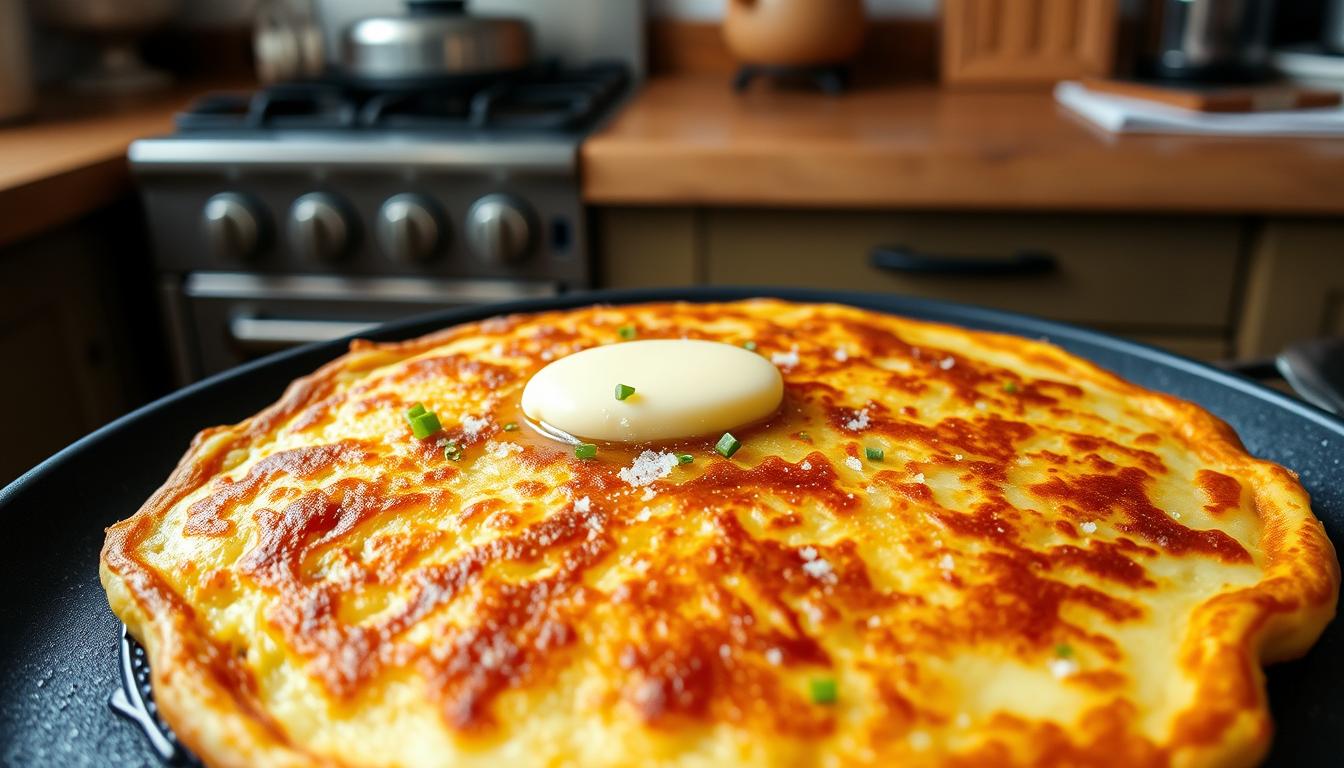
Imagine a dish that combines the simplicity of potatoes with the richness of traditional Irish cuisine. You’re about to discover the secret to making authentic Irish potato pancakes that are crispy on the outside and flavorful on the inside.
These delicious pancakes are a staple in Irish cuisine, and with this guide, you’ll learn how to make them a part of your family’s culinary tradition. By following a simple potatoes , you can create a dish that’s sure to impress.
Key Takeaways
- Learn the secret to making authentic Irish potato pancakes.
- Discover the importance of using the right ingredients.
- Understand the cooking techniques for achieving a crispy exterior.
- Find out how to make Irish potato pancakes a family favorite.
- Get tips on serving and enjoying your delicious pancakes.
The Rich History of Irish Potato Pancakes
The story of Irish potato pancakes is one of tradition and resilience, reflecting the heart of Irish culinary heritage. These pancakes, known as boxty, have been a part of Irish cuisine for centuries.
Origins in Irish Cuisine and Folklore
Boxty originated as a peasant food, made from grated raw potatoes, flour, and onions. It was a simple yet nourishing dish that sustained families through harsh winters and economic hardships. The dish is deeply rooted in Irish folklore, with stories and legends surrounding its creation and significance.
Cultural Significance During the Potato Famine and Beyond
The Potato Famine of the 1840s had a profound impact on Ireland, and boxty became a symbol of resilience during this period. Despite the famine, the tradition of making boxty continued, and it remains a beloved dish in Irish cuisine today. Its cultural significance extends beyond its role as a food item, representing the resourcefulness and strength of the Irish people.
Today, boxty is celebrated as part of Ireland’s culinary heritage, with various regions having their own unique recipes and cooking methods. This dish is a testament to the enduring legacy of Irish culinary traditions.
Understanding the Traditional Irish Boxty
Irish boxty, with its distinctive ingredients and preparation methods, is a potato pancake like no other. This traditional dish has been a staple in Irish cuisine for centuries, offering a unique culinary experience.
What Makes a Boxty Different from Other Potato Pancakes
Boxty stands out due to its use of raw, grated potatoes mixed with mashed potatoes, creating a distinctive texture. Unlike other potato pancakes, boxty often includes additional ingredients such as onions, garlic, and sometimes bacon or sausage, enhancing its flavor profile.
Key differences include:
- Use of both raw and cooked potatoes
- Inclusion of various meats or herbs for added flavor
- A denser texture compared to other potato pancakes
Regional Variations Across Ireland
Boxty varies significantly across different regions in Ireland. In the north, it’s often served with bacon, sausages, or black and white pudding, as part of a traditional Ulster fry. In contrast, boxty in other parts of Ireland might be simpler, focusing on the potato flavor.
| Region | Typical Ingredients | Serving Style |
|---|---|---|
| Northern Ireland | Bacon, sausages, black and white pudding | Part of an Ulster fry |
| Other regions | Potatoes, onions, garlic | Served with sour cream or applesauce |
As noted by Irish food enthusiasts, “Boxty is more than just a meal; it’s a connection to Ireland’s culinary past.” This quote encapsulates the cultural significance of boxty, highlighting its importance beyond the culinary realm.
Essential Ingredients for The Best Irish Potato Pancakes
Irish potato pancakes, or boxty, require a thoughtful approach to ingredient selection. The quality and type of ingredients you choose will significantly impact the final product’s taste, texture, and authenticity.
Selecting the Right Potatoes: Russet vs. Yukon Gold
The type of potato used is crucial for making excellent Irish potato pancakes. Russet potatoes are high in starch, which makes them light and fluffy on the inside while crispy on the outside when cooked. On the other hand, Yukon Gold potatoes have a buttery flavor and a smooth texture, offering a slightly different character to your boxty.
When deciding between Russet and Yukon Gold, consider the texture and flavor you prefer. Russet potatoes yield a more traditional, crispy exterior and fluffy interior, while Yukon Golds provide a richer, more complex flavor profile.
Traditional vs. Modern Ingredients
Traditional Irish potato pancake recipes often include simple ingredients like potatoes, onions, flour, and salt. Modern adaptations may incorporate additional elements such as garlic, scallions, or various herbs to enhance flavor.
While traditional ingredients provide an authentic taste, modern twists can offer exciting variations. You can experiment with different combinations to find the perfect balance for your taste buds.
Ingredient Substitutions for Dietary Restrictions
For those with dietary restrictions, there are several ingredient substitutions you can make. For example, you can use gluten-free flour to accommodate gluten intolerance. If you’re looking for a dairy-free option, consider substituting traditional butter with a vegan alternative.
By making thoughtful substitutions, you can enjoy Irish potato pancakes that cater to your dietary needs without compromising on flavor or texture.
Kitchen Tools You’ll Need for Perfect Results
To achieve perfect Irish potato pancakes, having the right kitchen tools is essential. The preparation process involves grating, squeezing, and frying potatoes, each step requiring specific equipment.
Traditional Irish Cooking Equipment
Traditionally, Irish cooks used simple, manual tools such as a box grater for grating potatoes and a cast-iron skillet for frying. Cast-iron skillets are still valued for their heat retention and ability to achieve a crispy crust on the pancakes.
- Box grater for grating potatoes
- Cast-iron skillet for frying
- Muslin cloth or a clean cotton towel for squeezing out moisture
Modern Alternatives for Home Cooks
For home cooks, modern alternatives can simplify the process. A food processor with a grating attachment can save time, while non-stick pans or electric skillets offer easier cleanup and more control over frying temperatures.
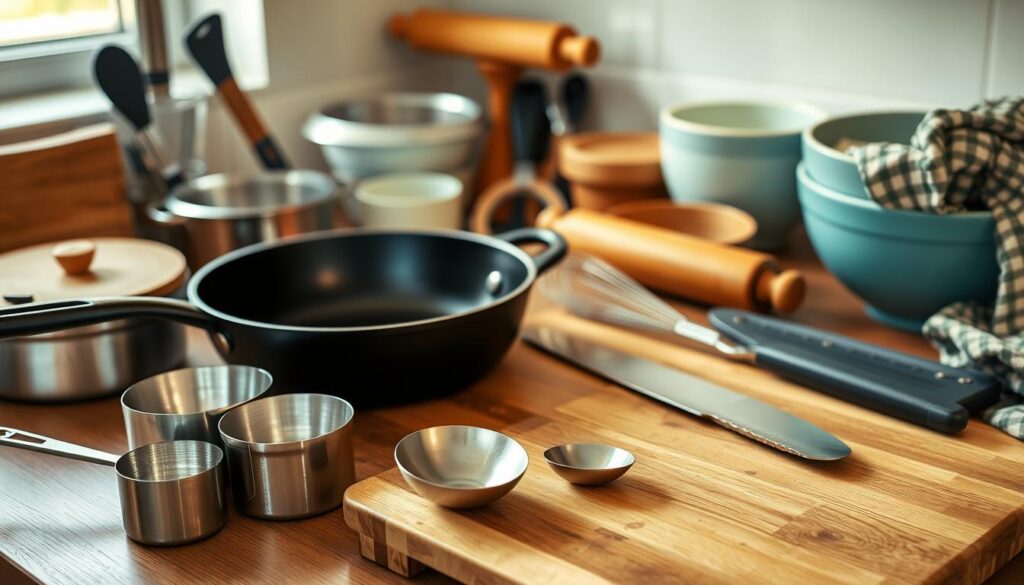
Comprehensive Step-by-Step Recipe
To make authentic Irish potato pancakes, follow this comprehensive step-by-step recipe that ensures crispy exteriors and fluffy interiors. The process involves several key steps, from preparing the potatoes to achieving the perfect batter consistency and employing the right cooking techniques.
Preparing and Grating the Potatoes
The first step in making Irish potato pancakes is to select the right potatoes. Russet or Yukon Gold potatoes are ideal due to their high starch content, which helps achieve the desired crispiness. Grate the potatoes using a box grater or a food processor with the shredding attachment. It’s crucial to grate the potatoes just before making the batter to prevent them from turning brown due to oxidation.
After grating, use a cheesecloth or a clean kitchen towel to squeeze out as much moisture from the potatoes as possible. This step is essential to prevent the pancakes from becoming soggy.
Mixing the Perfect Batter Consistency
To achieve the perfect batter consistency, combine the grated potatoes with flour, egg, and seasonings in a large bowl. The flour helps bind the mixture, while the egg adds moisture and richness. Be cautious not to overmix, as this can make the batter dense and heavy. The ideal batter should be moist but not wet, holding its shape when formed into patties.
A helpful tip is to adjust the batter consistency by adding more flour if it’s too wet or more egg if it’s too dry. This ensures that the pancakes will hold together well during cooking.
Cooking Techniques for Ideal Texture
Cooking Irish potato pancakes requires attention to temperature and technique. Heat a non-stick skillet or griddle over medium-high heat and add a small amount of oil to prevent sticking. Form the batter into patties and cook for about 4-5 minutes on each side, or until they are golden brown and crispy.
| Cooking Method | Temperature | Cooking Time |
|---|---|---|
| Pan-frying | Medium-high | 4-5 minutes/side |
| Baking | 400°F (200°C) | 20-25 minutes |
| Deep-frying | 350°F (175°C) | 3-4 minutes |
By following these steps and techniques, you’ll be able to create delicious Irish potato pancakes that are crispy on the outside and fluffy on the inside.
Mastering the Perfect Crispy Exterior
The secret to making irresistible Irish potato pancakes lies in mastering the art of creating a perfectly crispy exterior. This involves a combination of the right techniques and attention to detail during the cooking process.
Temperature Control Tips for Different Cooking Surfaces
Temperature control is crucial when cooking Irish potato pancakes. Whether you’re using a traditional cast-iron skillet or a modern non-stick pan, the key is to maintain the right heat. For a cast-iron skillet, preheat it over medium-high heat until it reaches a temperature of around 375°F (190°C). For non-stick pans, a medium heat setting is usually sufficient.
Here’s a comparison of different cooking surfaces and their ideal temperature settings:
| Cooking Surface | Ideal Temperature | Heat Setting |
|---|---|---|
| Cast-Iron Skillet | 375°F (190°C) | Medium-High |
| Non-Stick Pan | 325°F (165°C) | Medium |
| Electric Griddle | 350°F (175°C) | Medium-High |
The Secret to Golden Brown Perfection
Achieving a golden brown color on your Irish potato pancakes is not just about the temperature; it’s also about the cooking time and the batter composition. Ensure that your batter is not too wet, as this can prevent the pancakes from browning properly. Cook the pancakes for about 4-5 minutes on each side, or until they reach a golden brown color.
By mastering temperature control and adjusting your cooking technique, you can achieve perfectly crispy Irish potato pancakes with a golden brown exterior.
Traditional Irish Serving Suggestions
In Ireland, potato pancakes are not just a side dish but a central element of meals, paired with an array of flavors. Boxty, as it’s known in Ireland, has been a staple in Irish cuisine for centuries, and its serving suggestions are deeply rooted in tradition.
Classic Accompaniments and Toppings
Traditionally, Irish potato pancakes are served with simple yet flavorful accompaniments. Sour cream and chives are a classic combination, adding a tangy and oniony flavor to the dish. You can also top your boxty with apple sauce for a sweeter twist or with bacon or sausage for a heartier meal.
Other traditional toppings include smoked salmon and crème fraîche, offering a luxurious take on this humble dish. For a more modern approach, consider topping your boxty with avocado or a fried egg.
| Classic Toppings | Modern Twists |
|---|---|
| Sour cream and chives | Avocado |
| Apple sauce | Fried egg |
| Bacon or sausage | Smoked salmon with crème fraîche |
Pairing with Irish Breakfast, Lunch, or Dinner
Boxty can be enjoyed at any meal. For breakfast, pair it with bacon, eggs, and sausages for a filling start to the day. At lunch or dinner, it can accompany stews or roasted meats, soaking up the juices and flavors of the meal.
You can also serve boxty as a side dish to grilled fish or vegetables, adding a satisfying crunch to your meal. The versatility of boxty makes it a valuable addition to any Irish-inspired meal.
Storing and Reheating Your Potato Pancakes
To keep your Irish potato pancakes crispy and flavorful for later, follow these storage and reheating tips. Proper handling ensures that your pancakes remain a delight even after the initial cooking.
Proper Storage Methods to Maintain Texture
When it comes to storing potato pancakes, the key is to maintain their crispy exterior and fluffy interior. Once cooled, place the pancakes in a single layer on a baking sheet and freeze until solid. Then, transfer them to an airtight container or freezer bag, separating layers with parchment paper to prevent sticking. This method prevents moisture from accumulating and making the pancakes soggy.
Storage Tips:
- Cool pancakes completely before storing
- Use airtight containers or freezer bags
- Separate layers with parchment paper
- Store in the freezer for up to 3 months
Reheating Techniques to Restore Crispiness
Reheating potato pancakes requires a method that restores their crispiness without drying them out. The oven is an excellent tool for this task. Preheat your oven to 400°F (200°C), place the pancakes on a baking sheet lined with parchment paper, and bake for about 10-15 minutes, or until crispy and golden brown.
| Reheating Method | Temperature | Time |
|---|---|---|
| Oven | 400°F (200°C) | 10-15 minutes |
| Pan-frying | Medium heat | 2-3 minutes per side |
| Air Fryer | 375°F (190°C) | 5-7 minutes |
As culinary expert, Chef Maria, once noted, “The secret to great reheated potato pancakes is not just in the method, but also in the initial preparation. Ensuring they are cooked just right the first time makes all the difference.”
“The secret to great reheated potato pancakes is not just in the method, but also in the initial preparation. Ensuring they are cooked just right the first time makes all the difference.”
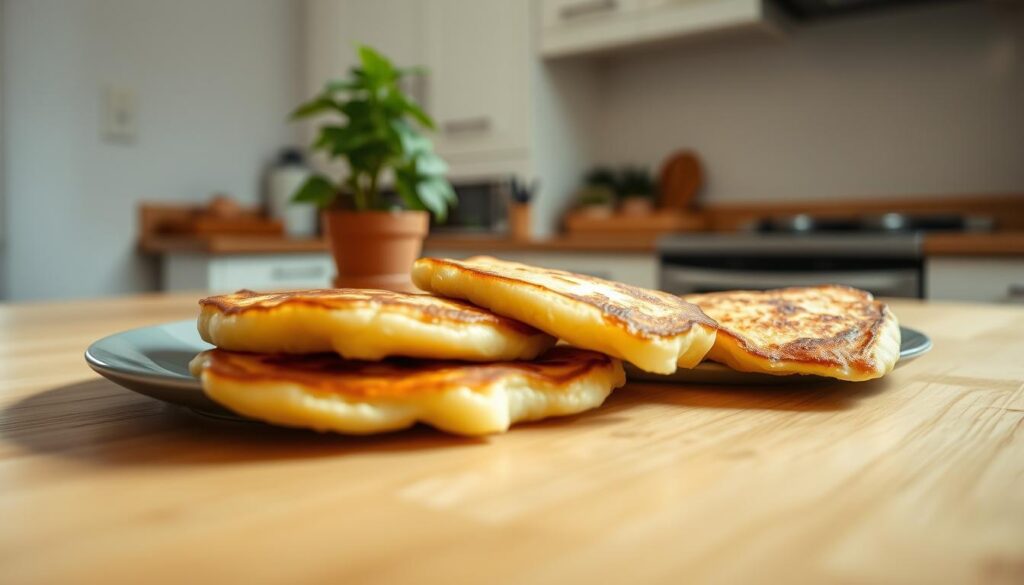
Modern Twists on Irish Potato Pancakes
Boxty, the Irish potato pancake, is not just a traditional dish; it’s a canvas for culinary creativity. As you explore modern Irish recipes, you’ll find that gourmet adaptations and international fusion inspirations are redefining this classic comfort food.
Gourmet Adaptations with Contemporary Ingredients
You can elevate the traditional boxty by incorporating contemporary ingredients. For instance, using truffle oil or infused olive oils can add a luxurious twist. Some recipes suggest adding caramelized onions or roasted garlic to enhance the flavor profile.
International Fusion Inspirations
Irish potato pancakes can be a base for international fusion dishes. You can draw inspiration from Korean cuisine by adding kimchi to your boxty batter, or go for a Mediterranean twist with feta cheese and kalamata olives.
| Fusion Cuisine | Key Ingredients | Flavor Profile |
|---|---|---|
| Korean-Irish | Kimchi, Gochujang | Spicy, Sour |
| Mediterranean-Irish | Feta, Olives, Sun-dried Tomatoes | Savory, Salty |
| Indian-Irish | Spices (Cumin, Coriander), Garam Masala | Warm, Aromatic |
By embracing modern twists and international flavors, you can transform the traditional Irish potato pancake into a dish that’s both innovative and delicious.
Troubleshooting Common Potato Pancake Problems
Irish potato pancakes can be finicky, but by understanding how to troubleshoot common problems, you’ll achieve perfect results every time. Making these delicious pancakes is not just about following a recipe; it’s also about being prepared to address any issues that arise during the cooking process.
Preventing Pancakes from Falling Apart
One of the most common issues with Irish potato pancakes is that they can fall apart during cooking. To prevent this, make sure you’re using the right type of potatoes and that they’re not too wet. Squeeze out as much moisture as possible from the grated potatoes using a cheesecloth or a clean kitchen towel. Additionally, ensure your batter is well mixed and not too thin.
Fixing Soggy Centers and Uneven Cooking
Soggy centers and uneven cooking can ruin an otherwise perfect batch of potato pancakes. To fix this, adjust your cooking temperature and ensure that your pan is evenly heated before adding the batter. Also, don’t overcrowd the pan, as this can lower the oil temperature and lead to soggy pancakes.
Adjusting Batter Consistency Issues
The consistency of your batter is crucial for making great Irish potato pancakes. If your batter is too wet, your pancakes may fall apart. If it’s too dry, they might not cook properly. Add ingredients gradually and adjust the consistency as needed to achieve the right balance.
Conclusion: Celebrating Ireland’s Culinary Heritage
As you master the art of making The Best Irish Potato Pancakes, you’re not only creating a delicious dish, you’re also celebrating Irish heritage and contributing to the preservation of Irish cuisine.
By embracing traditional recipes and techniques, you’re participating in a culinary tradition that spans generations. At the same time, you’re free to innovate and put your own twist on this classic dish, making it a true reflection of your own culinary creativity.
Whether you’re serving these crispy, flavorful pancakes at a family gathering or enjoying them on your own, you’re connecting with the rich history and culture of Ireland. So go ahead, get cooking, and savor the taste of Ireland’s culinary heritage.

